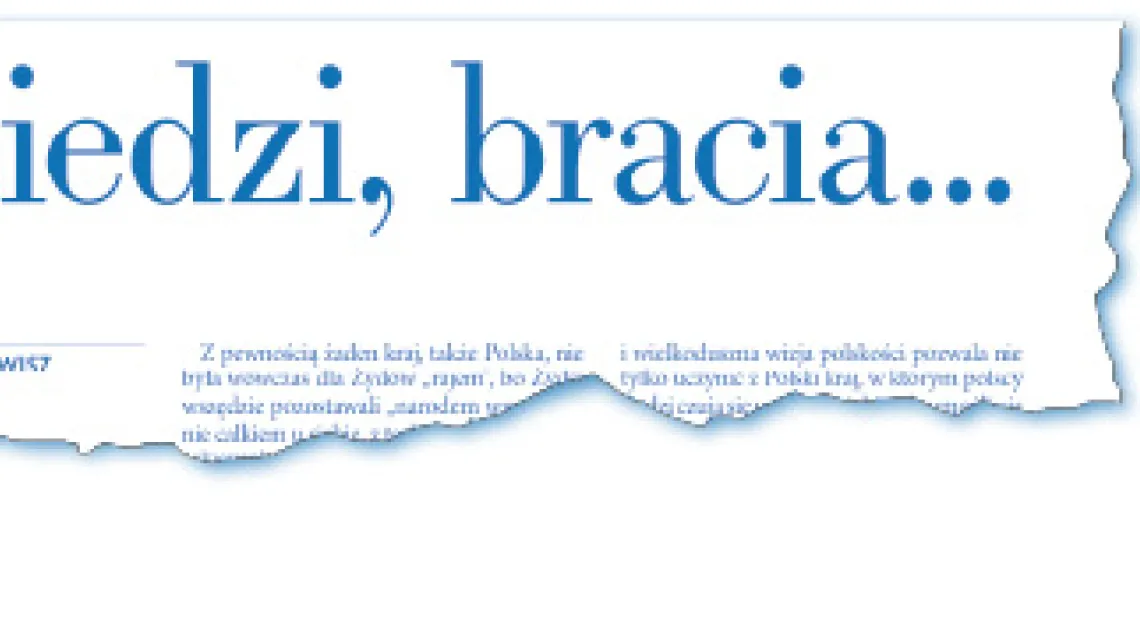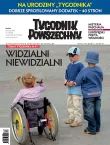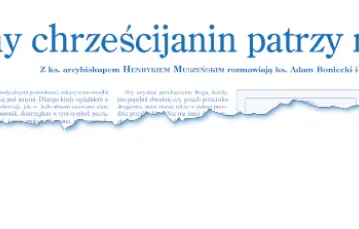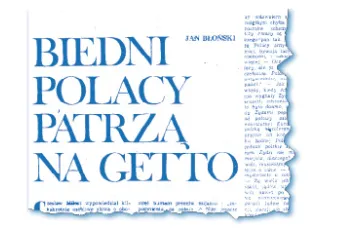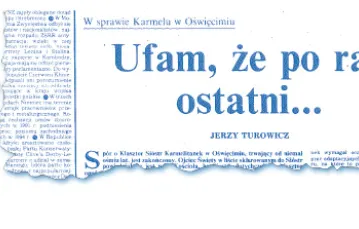Wykupienie dostępu pozwoli Ci czytać artykuły wysokiej jakości i wspierać niezależne dziennikarstwo w wymagających dla wydawców czasach. Rośnij z nami! Pełna oferta →
Cardinal Stanisław Dziwisz’s text appeared in Tygodnik Powszechny No. 11/09. The Archbishop delivered it on 6 March 2009 as an address to the “Catholic-Jewish Dialogue: Where We Have Come, Where We Need To Go" conference held at the Ignatianum Jesuit Centre for Culture and Dialogue in Kraków on the fifth anniversary of the death of Father Stanisław Musiał (other participants of the conference included: David Rosen, Chairman of the International Jewish Committee on Interreligious Consultations; Rabbi Michael Schudrich, the Chief Rabbi of Poland; Professor Tomáš Halík, President of the Czech Christian Academy; and Professor John Pawlikowski, President of the International Council of Christians and Jews). During the conference, a ceremony took place to award the first Father Stanisław Musiał Prize - for the year 2008; the winners were Professor Jan Błoński (posthumously) and the Town and Municipality of Chmielnik.
As archbishop of Kraków, Cardinal Dziwisz has on many occasions spoken about issues connected with Polish-Jewish and Christian-Jewish dialogue. Most recently, a few days prior to the publication of this issue of Tygodnik Powszechny, he expressed his pain and solidarity to the president of the Jewish Community of Kraków, Tadeusz Jakubowicz, on hearing about the profanation of the Monument to Jews Murdered in Płaszów (unknown perpetrators had painted swastikas and slogans such as “Jude raus" and “Hitler good" on the obelisk in red paint). “On behalf of the Church in Kraków, I wish to express my outrage and condemnation of this act of vandalism directed at the Jewish Community, which has rightly sought to remember those brutally murdered by the Nazis. All Christians, including the Church in Kraków, respect and support this remembrance," wrote the Cardinal.
We are the Children of one Father
Rabbi Rosen, Ladies and Gentlemen, Dear Brothers and Sisters,
It is with great joy that I accepted the invitation to speak during this conference, which has brought to Kraków people from all over the world who are committed to the dialogue that began at the Second Vatican Council and which has greatly altered relations between Christians and Jews.
I have come here to thank you for your courage and persistence in following the difficult path of dialogue. I also wish to assure you how much I share your desire for relations between Christians and Jews to continually improve as befits the children of One Father, the God of Abraham, Isaac, and Jacob.
The Splendour of Shared History
I stand before you today as the Bishop of Kraków, a special city: a city of kings and poets, of learned rabbis and Catholic saints, and of Copernicus and Pope John Paul II. It is no accident that the Polish Pope, the Pope from Kraków, did so much for the rapprochement and reconciliation between Christians and Jews. It was here that he matured for this mission.
Here the most important strands of the almost one thousand-year old history of Polish Jews interweave. The Kraków region was the scene of many of the events that Jews and Poles can remember with pride. But it was also a silent witness to the most tragic moments in the history of the Jewish people and in the history of humanity; moments which still evoke terror, pain and shame in our hearts.
On the one hand, Kraków is the city of King Kazimierz the Great, who opened the borders of the Polish Kingdom to Jews at the time when other European monarchs were condemning them to exile. It was because of him and other members of the Jagiellonian dynasty, who ruled from Kraków’s Wawel Castle for the following two centuries, that the tolerant and multinational Polish state became a kind of second homeland for the Jewish diaspora.
The Jewish town founded by King Kazimierz - Kraków’s [present-day district of] Kazimierz - became, within a few generations, one of the most important religious and cultural centres of the Jewish diaspora, second only to Prague. One of the greatest rabbis, Moses ben Israel Isserles, also known as Remu, was born in Kazimierz and lived and worked here until his death. He was Rector of Kraków’s yeshiva, a school famous across Europe.
The 16th century, which witnessed the flourishing of Kazimierz and other centres of Jewish life in Poland, is referred to as the Golden Age in both Jewish and Polish historiography. Because of the atmosphere of religious tolerance, so unique in those times, Poland was dubbed the “Jewish paradise" (Paradis Judeorum).
For sure, however, no country in the 16th century, Poland included, was a “paradise" for Jews, since Jews always remained an “exiled people", never entirely at home, longingly looking in the direction of Jerusalem. Nevertheless, until the fall of the Polish-Lithuanian Commonwealth [in the late 18th century], the Jewish community enjoyed freedom of religious practice and political autonomy, symbolised by the Jewish parliament, which was unheard of in other countries.
We Poles remember proudly this beautiful chapter in the history of Polish Jews and wish it were the only chapter. Alas, subsequent events took on an increasingly darker hue.
The Jagiellonian Tradition of Polish Identity
The end of Polish independence saw the rise of ethnic tensions that were deliberately and in various ways provoked by the partitioning powers [Prussia, Russia, and Austria] throughout the 19th century. Poles ceased to be masters of their own fate and faced the real threat of losing their national identity. Under these difficult conditions, the broad and multicultural understanding of Polish identity, of which Poles had previously been proud, was gradually replaced by a feeling of identity based strictly on ethnic grounds, which helped the conquered nation to consolidate in its struggle for freedom.
Yet, the Jagiellonian tradition of Polish identity, with its tolerance of other faiths and ethnicities, lived on. And it was this tradition which influenced the thinking of John Paul II, as evidenced in his book Memory and Identity, published a year before his death. Recalling the 1930s, just prior to the outbreak of the Second World War, he wrote, “Another hugely important element of Poland’s ethnic make-up was the Jews. I remember that at least a third of my classmates at the primary school in Wadowice were Jews. There were fewer at secondary school. Some were friends of mine. And what struck me about some of them was their Polish patriotism. The essence of Polishness, then, is multiplicity and pluralism, not parochialism and narrow-mindedness. It seems, though, that the ‘Jagiellonian’ dimension of the Polish identity, which I mentioned earlier, has unfortunately ceased to be self-evident in our times." (p. 87)
Ten years earlier, in his book, Crossing the Threshold of Hope, John Paul II stated, “Over the course of its thousand-year history, Poland was home to many nationalities and many faiths - mostly Christian, but not only. This tradition was, and perhaps still is, the reason why Poles are, for the most part, tolerant and open towards people who think differently, who speak other languages, or who believe, pray, or celebrate the same mysteries of faith in a different way." (p. 145)
In today’s fully independent Poland, when we are once again able to shape our own destiny, we believe that this vision of Polish identity referred to by the Holy Father is both pertinent and sound; a Polish identity which does not react to multiplicity and pluralism with fear and hostility, but which, from the perspective of Christian humanism, fully embraces human rights, appreciates the value of diversity, and always seeks to resolve conflicts through dialogue and a focus on the common good. This open and magnanimous vision of the Polish identity not only enables Poland to be a country where Polish Jews can feel at home, but which also enables the history of Polish Jews to be seen as an integral part of the history of Poland to which Jews for centuries contributed. This Jagiellonian vision of social life, so Polish at its roots, remains in harmony with the new understanding of the relationship between Church and the State, which is found in the Second Vatican Council’s Gaudium et Spes, the Pastoral Constitution on the Church in the Modern World. Archbishop Karol Wojtyła was deeply involved in drafting this Constitution. Today, this Jagiellonian vision is still much needed in Poland, Europe, and in the world as a whole, which, at this time of growing crisis, is once more threatened by a return to national egotism.
A Sea of Immorality
It was national egotism taken to an extreme in the form of German National Socialism that produced the darkest chapter in Jewish history, leading to an attempt to eradicate the entire Jewish people from the surface of the earth.
The young Karol Wojtyła was at that time a forced labourer in German-occupied Kraków, only a few dozen kilometres away from the most horrifying site of mass murder ever created, the Auschwitz-Birkenau death camp.
Hitler designated Polish soil to be a place of genocide. This land, which Poles and Jews had inhabited together, for better and for worse, for almost a thousand years, became a graveyard for millions of Jews exterminated by the Nazis.
In 1990, just after the fall of Communism, John Paul II reminded us of this irreversible loss, about which school textbooks in Communist countries had been silent for half a century. He did so at this particular time as if he wanted to remind us that this was a subject to which we would need to return in the free Poland. As he put it, “This people lived arm in arm with us for generations on that same land which became a kind of new homeland during the diaspora. This people was afflicted by the terrible deaths of millions of its sons and daughters. First, they were marked with special signs; then, they were shoved into ghettos, into isolated quarters. Then, they were carried off to the gas chambers, put to death - simply because they were the sons and daughters of this people. The assassins did all this on our land, perhaps to cloak it in infamy. However, one cannot cloak a land in infamy by the death of innocent victims. By such deaths, the land becomes a sacred relic. This people who lived with us for many generations has remained with us after the terrible death of millions of its sons and daughters. Together we await the Day of Judgement and Resurrection." (Jasna Góra Meditation, 26 September, 1990)
The attempt to exterminate an entire people was an endeavour so barbaric that the leaders of the allied states, and even the leaders of the Jewish diaspora in the United States, when notified about it by Polish couriers, for a long time could not believe it was true. John Paul II recalls this terrible time of humankind’s moral collapse, during which he formed his belief in the inalienable dignity of every human being, irrespective of their origin or worldview: “I have had personal experience of ideologies of evil. It remains indelibly fixed in my memory. First, there was Nazism. Although what we saw in those years was terrible enough, many aspects of Nazism were still hidden. The full extent of the evil raging through Europe was not seen by everyone, not even by those of us situated at its epicentre. We were plunged into a great explosion of evil, and only gradually did we begin to realise its true nature." (Memory and Identity, p. 13)
Guardians of Memory
Today, however, we do know the full extent of the unfathomable evil that happened. No one must diminish the tragedy of the Jewish people.
For this reason we join, in full solidarity, with our Holy Father Benedict XVI who, in the presence of representatives of Jewish organisations, prayed that “the memory of this appalling crime will strengthen our determination to heal the wounds that for too long have sullied relations between Christians and Jews." (26 February 2009)
As the sons and daughters of Poland, we are aware that this papal call concerns us in a particular way. We should be and want to be the guardians of memory of the Jewish world that existed for centuries in our cities, towns, and villages. We are aware of our obligation to eternally mourn our murdered Jewish neighbours whose innocent blood has seeped into our soil. We want to show due respect to the Jewish cemeteries, synagogues, and prayer halls often ruined by war. But, above all, we want to remember the extermination of our Jewish sisters and brothers in order that we may think with respect about Jews living today. The voices of the victims of the Holocaust remind us, more than anything else, that despite our differences we are still brothers and sisters. We want to open our conscience and allow in the voices of those innocent victims, which remind us that we are responsible for each other, that every human being is responsible for the fate of their brother or sister or neighbour.
We want to remember the Holocaust in order to built fraternal relations between Christians and Jews. That is why I fully concur with the words of the Polish Bishops’ Letter of 30 November 1995 to mark the 25th anniversary of the Second Vatican Council’s Nostra Aetate Declaration, which opened a new era in relations between the Church and the Jewish people. The letter reads, “The same land, which for centuries was the common fatherland of Poles and Jews, of blood spilled together, a sea of horrific suffering and of injuries shared, should not divide us but unite us.
For this commonality cries out to us - especially the places of execution and, in many cases, common graves."
In this memorable letter, which has lost nothing of its relevance, the Polish bishops express their pain resulting from the fact that although many Poles saved Jews during the Holocaust, and hundreds, if not thousands, paid for this with their own life, there were also those who remained indifferent to this incomprehensible tragedy. “We are especially disheartened," write the Polish Bishops, by those among Catholics who in some way were the cause of the death of Jews. They will forever gnaw at our conscience on the social plane. If only one Christian could have helped and did not stretch out a helping hand to a Jew during the time of danger or caused his death, we must ask for forgiveness of our Jewish brothers and sisters."
In the letter, the Polish bishops also express their “sincere regret for all the incidents of anti-Semitism which were committed at any time or by anyone on Polish soil."
Dialogue: Another Name for Love
At the centre of the biblical vision of religious life, common to Jews and Christians alike, is a rejection of evil in favour of good, repentance, and atonement. For a Christian, the examination of conscience, discovering one’s sinfulness, abandoning the wrong path, and the change of attitude towards other human beings is a joyful, liberating experience. Therefore, a Christian has no reason to run away from even the saddest truth of having trodden the wrong path in the past, contrary to the will of God. In this spirit, during the Great Jubilee of the Year 2000, John Paul II encouraged the whole Church to courageously confess its misdeeds and open a new chapter, also in the relations between the Church and our brothers and sisters, the Jews.
Today, the Church, including the Church in Poland, wishes to follow the example set by John Paul II and courageously uncover and reject everything that makes our life depart from the Gospel. Sometimes people ask the question: Why do Polish Catholics need Catholic-Jewish dialogue in the country where there are so few Jews living today? The answer is straightforward: our attitude towards people of different faith is a yardstick of the quality of our Christianity. Christianity that is contaminated with hatred and contempt for other human beings is a defective Christianity. We were called by God to build bridges and create an atmosphere of communion across the world, and not to create divisions or stir up hatred.
Pope Paul VI said that “dialogue is another name for love." That is why treating another human being in the spirit of dialogue rather than of enmity or distrust is simply practising the commandment to love thy neighbour. And to love thy neighbour is at the very heart of Christianity. Where there is hatred or contempt for other people, there is no love of one’s neighbour; where there is no love, there is no Christianity.
We Christians must not forget the radical dimension of Christ’s teachings on the love of one’s neighbour. Christ rejects the practice of limiting love to one’s own kind, “For if you love those who love you, what reward do you have?" (Matthew 5.46). The best example of evangelical love is the Good Samaritan who gave assistance to a Jew wounded by robbers, a Jew with whom he shared neither a common race nor religion.
Christianity devoid of the love of one’s neighbour loses its power and risks becoming like stale salt, which loses its taste and becomes useless. Christianity without the love of one’s neighbour, which disregards painful scars and sometimes baseless or exaggerated accusations and generalisations, ceases to be itself; it ceases to reveal the teachings of Jesus, whose only response to his own suffering was the prayer, “Father forgive them for they know not what they do." (Luke 23.34)
Brothers Reunited
Nowadays, when we particularly value authentic attitudes and convictions, we want to be faithful to Christ’s call to show magnanimity towards all fellow human beings irrespective of their race or creed. For this reason, we note with shame that despite the unambiguous teachings of recent Popes on the appropriate attitude of Catholics towards Jews, many of us have not been able to overcome prejudices, inveterate resentments, and harmful stereotypes. Out of concern for the integrity of the Church’s teachings with respect to Jews and cognisant of our responsibility for the image of the Church in the eyes of the young generation, we must not rest in our determination to oppose all manifestations of anti-Semitism, which John Paul II did not hesitate to label a sin. I assured my Jewish brothers and sisters of this when praying with them recently at the end of the Sabbath in the Tempel Synagogue in Kraków’s Kazimierz.
The direction in which we are to go, the path towards full reconciliation and friendship between our communities, has been clearly marked out by the declarations of the Second Vatican Council and the binding statements of the Magisterium of the Church. There is no retreat from this path, which was determined by the Vatican Council and unambiguously endorsed by successive Popes and, recently, has been wholeheartedly supported by the Holy Father, Pope Benedict XVI.
During his numerous meetings with representatives of the Jewish community, John Paul II often repeated that we are only at the beginning of our journey towards the common aim of full reconciliation. The first disciples of Jesus Christ, as well as His Mother, were Jews who also after His death prayed together with their Jewish compatriots at the Temple in Jerusalem and in synagogues. Later, for almost two thousand years, we did much to drive each other apart.
Barely two generations have passed since we began to take conscious and decisive efforts to come closer together. During his memorable 1986 visit to the Great Synagogue of Rome, John Paul II told the Chief Rabbi of Rome when they embraced each other, “We are like brothers who have found each other after a very long time." Thanks to God, this is the situation in which we find ourselves today. Yet, since we have been reunited only recently, we still know too little about each other, we trust each other too little. We do not always feel like being together, as brothers would.
Now that, since the fall of Communism, we are able to take full responsibility for shaping social life in Poland, we have done much to ensure that this newfound fraternity between Christians and Jews is accepted universally and joyfully as a gift. Because we are indeed a blessing to each other, a gift from God who is faithful to the “promise made to Abraham and to his posterity, for ever. (Luke 1.55)
Transformation of Hearts and Minds
The turnaround in Christian-Jewish relations that occurred after the last Vatican Council was partly a response to shock humanity experienced in the 20th century when it became aware of the huge suffering that can be caused by prejudice and hatred of others. Cognisant of this, the Church wishes to engender a profound transformation in the hearts and minds of its sons and daughters with regard to their attitude towards Jews. This transformation should take place at the level of theology and religious instruction, at local churches, and in every parish.
We are still at the beginning of our journey, aware of the Church’s special responsibility for shaping the attitudes of the faithful, particularly in a country where Christianity is so dominant; hence the key role of the Polish Episcopate’s Commission for Dialogue with Judaism.
We realise how important it is to create a new generation of priests in the spirit of the post-Vatican II teachings of the Church. We are ready to meet this challenge. One example of our commitment is the participation over the past few years of successive groups of Polish priests and professors of religious seminaries in courses organised by the Yad Vashem Institute in Jerusalem. Such participation affords a greater insight into Jewish sensitivities with regard to the Holocaust.
If reunited brothers are to grow closer, they must get to know each other better. In this area, more is being done in Poland with every passing year. For more than a decade, Judaism Day has been observed by the Polish Catholic Church. On this day, Catholics discover the close ties that exist between their own religion and Judaism, and - where possible - meet with members of the Jewish community to pray for each other, as is done every year in Kraków.
In places where there are larger Jewish communities, we can witness increasingly close cooperation between Christians and Jews, often within an organisational framework. In Warsaw, the Polish Council of Christians and Jews has been active for more than twenty years. Recently, the Club of Christians and Jews has been established in Kraków, whose Management Board I had the pleasure of meeting. And in Oświęcim, near to the Auschwitz-Birkenau death camp, is the Centre of Dialogue and Prayer, opened in 1992, which provides a space for spiritual reflection. The Centre reflects the Kraków Church’s concern that the faithful maintain a respectful attitude towards a place where such horrendous crimes took place.
At Polish universities, including Catholic universities, there exist centres for Jewish studies, studies on Christian-Jewish relations, and on Holocaust-related issues. New centres for inter-religious dialogue are emerging, as are organisations working towards reconciliation.
For sure, the subject of Christian-Jewish dialogue will also be present on the new community website of the Kraków Archdiocese: www.franciszkanska3.pl, which is specifically aimed at young people.
I also gladly welcome the new initiative that is Father Stanisław Musiał Prize, which is to be awarded each year to persons and institutions that have made a special contribution to Christian-Jewish and Polish-Jewish reconciliation.
Most encouraging are the numerous grassroots initiatives organised in small localities, such as the town of Chmielnik, which is today receiving the Father Musiał Prize. In places where there are no longer any Jews, and where only Jewish graves and memories - sometimes difficult memories - survive, there is a particular need for people of goodwill who can support others in their difficult work on themselves, on the “cleansing of memory." In such places, especially commendable are all efforts to overcome ancient prejudices and to promote good in accordance with the words of John Paul II, “You must demand of yourselves, even when others do not demand of you." (18 June 1983)
The success of the various initiatives undertaken over the past two decades is attested by the fact that both within the Church and in society generally there has been no attempt to evade difficult questions. One of the best examples of this is the work of the late Professor Jan Błoński, another winner of this year’s Father Musiał Prize. Representatives of the Church, too, including bishops and priests, have not avoided participation in the most difficult national debates of recent years, such as the one concerning the tragic events in Jedwabne.
Safeguarding the Good
In all these efforts undertaken in the hope of full reconciliation, we strongly feel the need for support from our Jewish brothers and sisters. Bearing in mind the huge numerical disproportion between our two communities, Polish Christians and Polish Jews, we are especially counting on the good faith and commitment to this dialogue from representatives of the Jewish community in Israel and the United States. In particular, we endorse the idea, suggested by both sides for quite some time, that more frequent meetings should take place between young Poles and Jews. We understand that young Jews come to Poland principally in order to visit Jewish martyrdom sites. At the same time, however, we are aware that it is only through genuine meetings between young members of our communities that we will be able to heal old wounds, remove unnecessary barriers, enhance mutual trust, and deepen our fraternal bonds.
During his 1991 pilgrimage to Poland, John Paul II spoke to the Jewish community of Warsaw about the new tasks that lay ahead in the free Poland. He said, “Today, it seems to be a matter of great importance that, on both sides, we should try to perceive, salvage, and renew the good things that happened between us over the centuries, and there were many such good things. We should also try to seek reconciliation and friendship despite the evil, because there was also much evil in our common history." (9 June 1991)
As dialogue obliges us to be completely honest, we must not overlook the fact that we still need to overcome the mutual aversion that poisons our relations. For sure, eradicating mutual prejudice and opposing all instances of it is one of the prerequisites of full reconciliation. However, we need to show great courage, determination and wisdom so that the creation of this new fraternity is not derailed by individuals and groups on both sides who, despite efforts, have not been yet won over to the new vision of relations between Christianity and Judaism.
By persisting in our aim of reconciliation between Christians and Jews, we express the unwavering hope that our dialogue will progress and that the efforts made by both sides will be met with friendliness and reciprocity. We believe that, thanks to mutual understanding, the focus will not just be those activities that undermine the process of reconciliation but rather on the commitment of those many good people who do much for the cause of rapprochement and who themselves often feel hurt by the words or actions of some of their fellow-believers.
Era of Reconciliation and Peace
For many Christians and Jews, and for me personally, one of the most moving moments of the long pontificate of John Paul II was his visit to the Hall of Remembrance in Jerusalem, where a crypt in front of the memorial flame contains the ashes of Jews murdered during the Holocaust. There, in his welcoming speech, the Prime Minister of Israel, Ehud Barak, born after the war, said, “Your Holiness ... A 2,000-year-old historical cycle is returning here to its beginning, bearing the weight of remembrance - its richness and pain, its light and shadows, its song and laments. The wounds of time will not be healed in a day, but the path which brought you here leads to a new horizon. This hour will go down in history as a propitious hour, a moment of truth, the victory of justice and hope." (23 March 2000)
During that same visit, John Paul II said the following words to the President of Israel, “We must work for a new era of reconciliation and peace between Jews and Christians. My visit is a pledge that the Catholic Church will do everything possible to ensure that this is not just a dream but a reality." (23 March 2000)
I would like these two voices, full of hope and determination, to be a source of inspiration in our further efforts towards reconciliation. Let them ring in our ears, especially when the temptation arises to abandon the path of dialogue and enter the easier path of accusation and confrontation.
For my part, here in Kraków, at the foot of Wawel Hill, on which stand the Royal Castle of Kazimierz the Great and the Cathedral Church where Karol Wojtyła was anointed, I wish to reassure all of you and to pledge that the Catholic Church in Poland, in unison with Pope Benedict XVI, will do everything it can to draw closer to this new horizon, namely, to ensure that the newfound fraternity between Christians and Jews is able to flourish.
Cardinal STANISŁAW DZIWISZ (born 1939) is Archbishop of Kraków and a member of the Permanent Council of the Polish Episcopate. A long-time aide to Karol Wojtyła (John Paul II), he is a doctor of theology and a member of three Vatican dicasteries: the Congregation for Catholic Education, the Pontifical Council for Social Communications, and the Pontifical Council for the Laity.

